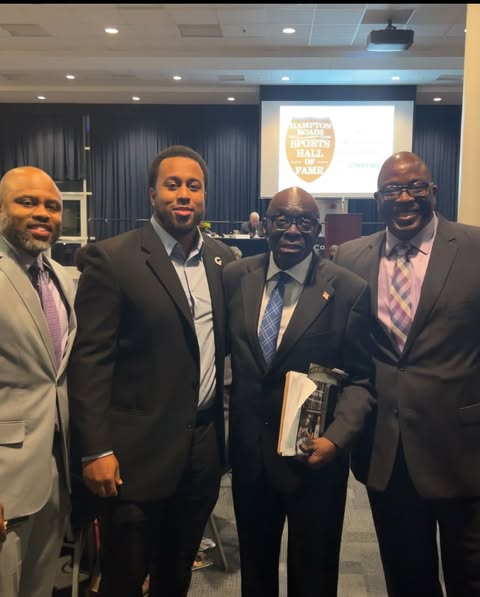Tommy Reamon Sr., the revered former NFL and World Football League (WFL) running back turned legendary high school football coach, has died at the age of 73, his son Tommy Reamon Jr. confirmed early Thursday morning. In a heartfelt social media post, the younger Reamon shared the somber news, closing a deeply emotional chapter marked by his father’s extended hospitalization and community-wide concern. The elder Reamon’s death signifies more than the loss of an accomplished athlete—it brings to a close one of the most remarkable stories in Virginia sports history, a legacy deeply intertwined with the fabric of Hampton Roads and with names like Michael Vick, who emerged from Reamon’s mentorship into the national spotlight.
Reamon Sr.’s story is the very embodiment of perseverance, purpose, and transformation. Born in an era when opportunities for Black athletes were severely limited, he rose through sheer grit and talent to reach the pinnacle of American football. Drafted by the Pittsburgh Steelers in the 1970s, Reamon’s professional playing career did not unfold in the traditional trajectory many might expect from an NFL draftee. He never quite found a permanent foothold in the league, but this apparent detour ultimately served as the launching pad for a career that would influence thousands. It was in the World Football League—a short-lived but competitive arena that briefly rivaled the NFL—that Reamon’s on-field prowess found its fullest expression. There, he earned the respect of teammates and opponents alike, proving himself as a dynamic and tenacious running back.
Yet, it would not be his rushing yards or touchdowns that defined Tommy Reamon Sr.’s enduring contribution to the sport. That distinction belonged to his second act—as an educator, mentor, and builder of young men in Hampton Roads, Virginia. With coaching stints at Ferguson High School, Warwick High School, Denbigh High School, and finally, the head coaching position at Landstown High School in Virginia Beach, Reamon’s post-playing career became a model of community-focused leadership. These were not merely jobs; they were missions of transformation. He shaped boys into men, players into leaders, and athletes into scholars.
It was during his time at Warwick High School that Reamon encountered a young quarterback with a rare blend of speed, agility, and vision—Michael Vick. Under Reamon’s tutelage, Vick’s talents were honed and focused, but even more critical was the structure and values instilled in him. Reamon saw more than potential in Vick; he saw purpose. He guided him through the rigorous expectations of both football and academics, making clear that success off the field was as important as accolades on it. Vick’s eventual rise to national prominence as a Virginia Tech standout and NFL star would become a testament to Reamon’s visionary mentorship. Vick himself has often spoken publicly about Reamon’s pivotal role in shaping his life.
But Vick was far from the only athlete to benefit from Reamon’s influence. Over decades of coaching, Reamon developed a reputation for not only cultivating football talent but also producing men of character. Many of his former players advanced to college football programs; some made it to the pros. But even those who didn’t pursue athletics beyond high school carried forward the values Reamon had instilled in them—discipline, accountability, teamwork, and resilience. These were the intangible qualities that made Reamon’s impact immeasurable.
Beyond the football field, Reamon was known in Newport News and Virginia Beach as a cornerstone of the community—a figure whose presence in young athletes’ lives often extended well beyond practice hours. He offered guidance when family structures were fragile. He served as a motivator when self-belief was in short supply. He was, to many, a surrogate father, and to all, a source of unwavering support. His former players recall not just his halftime speeches or coaching drills, but his life lessons, his unwavering expectations for excellence, and his heartfelt commitment to their well-being.
The outpouring of grief and remembrance following the news of his passing reflected the scope of his influence. Former players, colleagues, local leaders, and fans filled social media with tributes—some recalling a pivotal conversation, others a moment of tough love, still others reflecting on how Reamon’s belief in them altered the trajectory of their lives. These testimonials, organically blooming across platforms, formed a digital memorial that underscored his stature in the region.
For weeks leading up to his death, Tommy Reamon Jr. kept the community informed about his father’s declining health. On May 17, in a particularly poignant post on X (formerly Twitter), he expressed the emotional toll of the situation. “We’re approaching two months of my dad being in the hospital,” he wrote. “He has not been making the improvements like we all would hope. It’s been an emotional battle every single day.” That message, which concluded with the heartfelt words, “Pops, I love you. The city loves you. We’re in this together,” encapsulated the personal and communal bond that defined Reamon’s life.
The Reamon family’s decision to share updates so candidly offered the public a glimpse into the private struggle they faced—a struggle met not with despair, but with the same tenacity and grace that characterized Tommy Sr.’s career. Even in his hospital bed, the symbolic weight of his life was evident; he remained a source of unity, of inspiration, of hope.
To understand Reamon’s significance, one must also appreciate the unique historical and social context of Hampton Roads, a region that, while culturally rich and athletically vibrant, has often wrestled with systemic inequities. For decades, the area has been a cradle of football talent, particularly among African American youth seeking pathways to opportunity and recognition. Coaches in such communities do more than instruct—they uplift. And among them, none stood taller than Reamon. His football programs were safe havens and launching pads, balancing structure with love, accountability with compassion.
Statistically speaking, the impact of sports mentorship in communities like Hampton Roads is well-documented. Studies consistently show that participation in structured athletic programs correlates with increased academic performance, reduced dropout rates, and decreased juvenile delinquency. Coaches like Reamon are often at the center of these outcomes, using sport as a vehicle to foster holistic development. But what made Reamon’s influence so singular was his ability to personalize that mission. Each player felt seen. Each challenge was met with customized support. It wasn’t about football alone; it was about crafting futures.
His coaching tenure at Landstown High School in Virginia Beach represents a particularly successful chapter in his legacy. Under his guidance, the school developed one of the region’s most competitive football programs, earning not just victories but respect. Landstown’s ascendancy under Reamon was not coincidental—it was a manifestation of strategic discipline, talent cultivation, and unrelenting dedication. Even amid the pressures of high school athletics, where external distractions and internal doubts often collide, Reamon maintained a standard of excellence that inspired coaches across the state.
The timing of Reamon’s death also lends itself to broader reflection. As football continues to grapple with questions of health, identity, and purpose—from concussions to the increasing commercialization of youth athletics—the story of Tommy Reamon Sr. offers a counterpoint. Here was a man who never lost sight of the human element, who coached not for fame or fortune, but for the lives that could be touched, the possibilities that could be realized. His legacy is proof that amid the machinery of sports, integrity and compassion still have a place.
As tributes continue to surface in the days and weeks ahead, they will likely deepen public understanding of just how profound his influence truly was. For educators and coaches, Reamon’s life will stand as a case study in purpose-driven leadership. For athletes, it will remain a roadmap to resilience. And for Hampton Roads, his memory will be woven into the very identity of its athletic and educational landscape.
The final months of Tommy Reamon Sr.’s life were not filled with silence or isolation. They were marked by love, by public recognition, and by an intimate sharing of his journey through the eyes of his son. In choosing to open that window to the public, Tommy Jr. reinforced a fundamental truth about his father—that he was, and remains, a man of the people.
In death, as in life, Tommy Reamon Sr. continues to teach. He reminds us that greatness is not measured in professional contracts or championship rings, but in the ability to elevate others. He reminds us that community service through coaching is not a secondary pursuit, but a calling of the highest order. He reminds us that the legacies worth preserving are those built not on ego, but on empathy.
His absence will undoubtedly be felt this fall when the whistles blow, and the lights go up on Friday nights across Hampton Roads. But his voice—calm, firm, inspiring—will still echo in the locker rooms, the classrooms, and the memories of those he molded. In every play called with courage, in every young man who lifts a teammate, in every life that takes a better path because of one man’s guidance, the spirit of Tommy Reamon Sr. lives on.
And that, perhaps, is the truest measure of a life well lived.


Leave a Reply